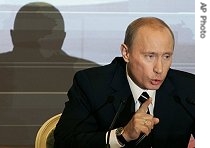-
(单词翻译:双击或拖选)
By Peter Fedynsky
Washington
22 February 2007
watch Putin Speech report
Recent harsh criticism of the United States by Russian President Vladimir Putin has raised questions about Kremlin intentions and the state of bilateral1 relations between Washington and Moscow. Here with details is VOA's Peter Fedynsky.
Speaking in Germany at the recent Munich Conference on Security Policy, Russian President Vladimir Putin accused the United States of imposing2 its economic, political, cultural and educational policies on other nations.
 |
| Russian President Vladimir Putin, 1 Feb 2007 |
In Washington, President Bush said Mr. Putin remains5 the same strong-willed person that he was in 2001, when Mr. Bush pronounced his Russian counterpart trustworthy. "He is a person with whom I have had agreements and disagreements throughout the course of my presidency6 and his. We've disagreed on the utility of NATO. I've tried to convince Vladimir that NATO is positive. It's a positive influence that democracies on your border are good things to have. The democracies tend not to fight each other."
After his speech, President Putin described Mr. Bush as a decent person and expressed agreement that Russia and America will never be opponents again.
Nonetheless, the Kremlin leader believes NATO is a serious provocation7 that is helping8 create a virtual division of Europe, similar to the Berlin Wall during the Cold War period.
Lithuanian President Valdus Adamkus, whose country joined NATO after a half century under Soviet9 domination, dismisses Mr. Putin's Munich speech. "I believe this is not going to sway the free people from, I mean, its ideals, the direction we are going together. And I think the final outcome will be -- this is what we dream about, this is what the American people stand for, for centuries."
Mr. Bush notes that the United States and Russia have common interests in the security of their peoples and the world.
But Ariel Cohen, a Russia expert at the Heritage Foundation think tank in Washington, DC, says Mr. Putin is playing on anti-American sentiments in Europe and the Middle East to undermine global security. "And of course that helps for Putin when he goes to the Middle East to sell nuclear reactors10, to sell weapons; the billions of dollars worth of weaponry that Russia offered to the Arab market was quite noticeable."
Mr. Putin also accused the Organization for Security and Cooperation in Europe, or OCSE, of meddling11 in the internal affairs of member states. But the immediate12 past president of the OSCE parliamentary assembly, U.S. Congressman13 Alcee Hastings, says the organization's agreement specifically allows monitoring. "Let me read: "Categorically and irrevocably, the countries, the participating states, including Russia and the United States, irrevocably declare that commitments undertaken in the field of the human dimension are matters of direct and legitimate14 concern to all participating states and do not belong exclusively to, quote, "the internal affairs of the state concerned."
The former U.S. representative to the United Nations, Ambassador John Bolton, says he does not understand the reasons behind President Putin's speech. "Because it does not reflect the real status of the bilateral relationship and many areas of cooperation we have, or the assurances that we have provided over the years about such things as missile defense15, which are not aimed against Russia, or Russia's nuclear capability16, but aimed to protect the United States from strikes by rogue17 countries like Iran or North Korea."
Ambassador Bolton says the Munich speech indicates that the United States has more diplomatic work to do with Russia. Bolton also expresses hope that President Putin's remarks represent a misimpression about the United States, and not a change in Russian policy.
 收听单词发音
收听单词发音
1
bilateral

|
|
| adj.双方的,两边的,两侧的 | |
参考例句: |
|
|
|
2
imposing

|
|
| adj.使人难忘的,壮丽的,堂皇的,雄伟的 | |
参考例句: |
|
|
|
3
stimulates

|
|
| v.刺激( stimulate的第三人称单数 );激励;使兴奋;起兴奋作用,起刺激作用,起促进作用 | |
参考例句: |
|
|
|
4
inevitably

|
|
| adv.不可避免地;必然发生地 | |
参考例句: |
|
|
|
5
remains

|
|
| n.剩余物,残留物;遗体,遗迹 | |
参考例句: |
|
|
|
6
presidency

|
|
| n.总统(校长,总经理)的职位(任期) | |
参考例句: |
|
|
|
7
provocation

|
|
| n.激怒,刺激,挑拨,挑衅的事物,激怒的原因 | |
参考例句: |
|
|
|
8
helping

|
|
| n.食物的一份&adj.帮助人的,辅助的 | |
参考例句: |
|
|
|
9
Soviet

|
|
| adj.苏联的,苏维埃的;n.苏维埃 | |
参考例句: |
|
|
|
10
reactors

|
|
| 起反应的人( reactor的名词复数 ); 反应装置; 原子炉; 核反应堆 | |
参考例句: |
|
|
|
11
meddling

|
|
| v.干涉,干预(他人事务)( meddle的现在分词 ) | |
参考例句: |
|
|
|
12
immediate

|
|
| adj.立即的;直接的,最接近的;紧靠的 | |
参考例句: |
|
|
|
13
Congressman

|
|
| n.(美)国会议员 | |
参考例句: |
|
|
|
14
legitimate

|
|
| adj.合法的,合理的,合乎逻辑的;v.使合法 | |
参考例句: |
|
|
|
15
defense

|
|
| n.防御,保卫;[pl.]防务工事;辩护,答辩 | |
参考例句: |
|
|
|
16
capability

|
|
| n.能力;才能;(pl)可发展的能力或特性等 | |
参考例句: |
|
|
|
17
rogue

|
|
| n.流氓;v.游手好闲 | |
参考例句: |
|
|
|















